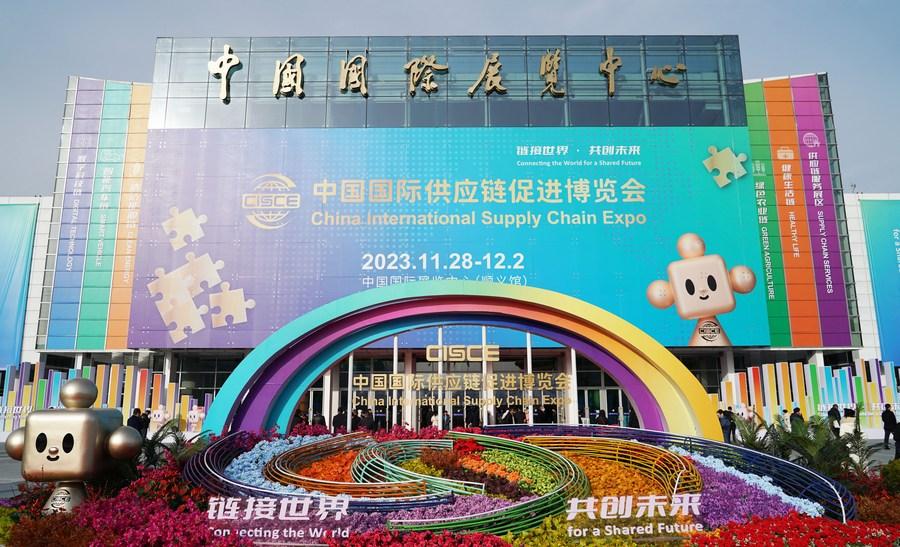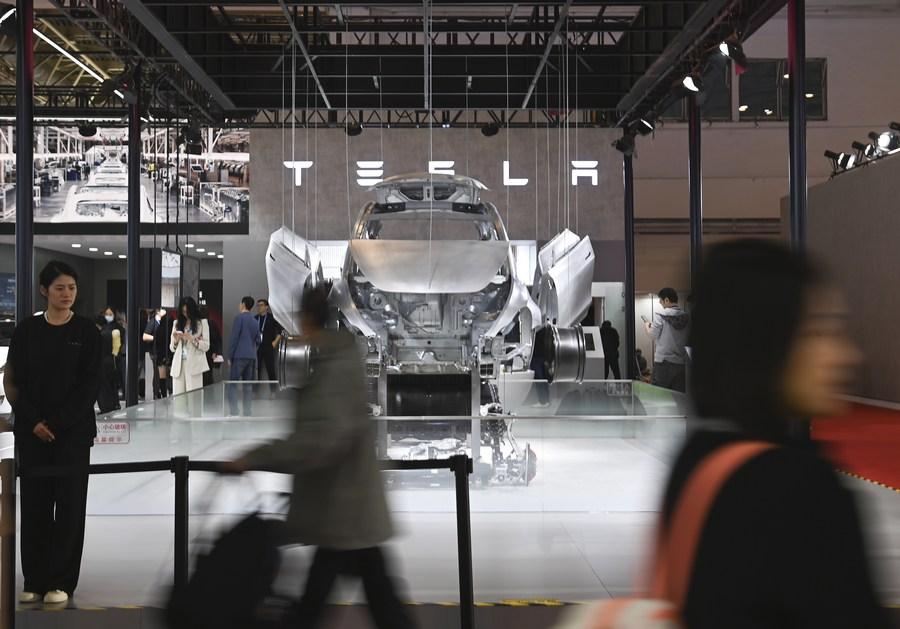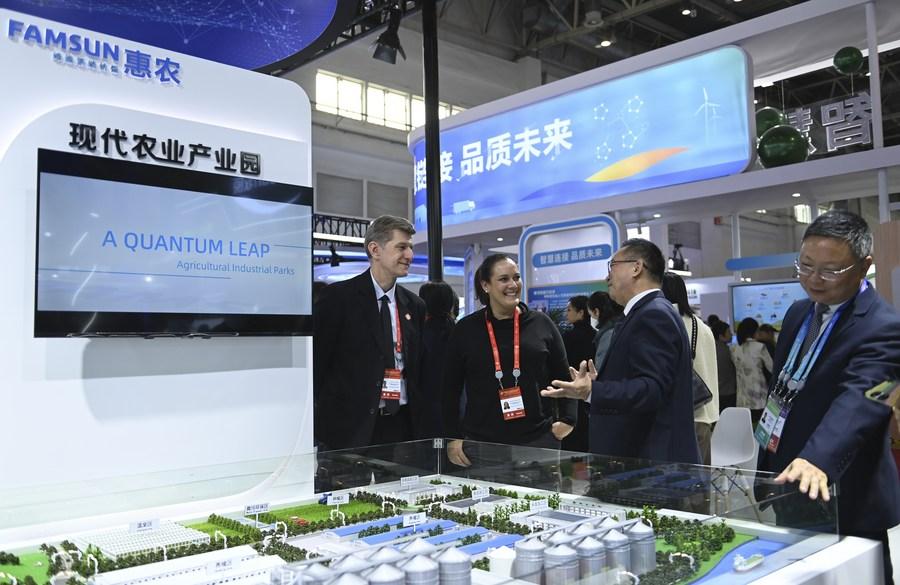

This photo taken on Nov. 28, 2023 shows an exterior view of the venue for the China International Supply Chain Expo in Beijing,
For Zhang Yihao, president and CEO of GE Healthcare China, the collective debut of more than 20 key suppliers at the ongoing China International Supply Chain Expo (CISCE) was "particularly meaningful."
"This line-up well illustrates a cluster effect on China's high-end medical equipment manufacturing, as the locations of these suppliers cover a wide swath of China from the Beijing-Tianjin-Hebei area, the Yangtze River Delta, the western interior to the Greater Bay Area," Zhang said.
"We believe in the field of medical technology, and we are ushering in the best era for development," Zhang said. "Industrial chain innovation and high-quality development will be the priority."
Together with Zhang, many prominent figures from the business sector and international organizations have expressed their optimism over the lasting appeal of the Made-in-China concept as the country boasts striking manufacturing advantages.
Complete industrial chain
With the world's most comprehensive industrial categories and a well-rounded industrial system, China has sustained its status as the "world's manufacturing hub" and attracted global firms to beef up investment there.
China's manufacturing sector topped the world in size for 13 consecutive years in 2022, with the added value of this sector contributing to over 30 percent of the world's total, according to a flagship report titled the Global Supply Chain Promotion Report released Tuesday.
GE Healthcare displayed its up-to-date medical imaging technologies at the expo. The company has established five manufacturing bases across China, with another under construction.
Zhang said that China's complete industrial system has helped his company thrive in China's medical device market, noting more investment will be channeled into cultivating a more resilient and secure supply chain for medical equipment manufacturing, and more production lines will be introduced into China.
"As we extend our footprint in the Chinese medical manufacturing market, our confidence in the ongoing investment in China is growing," he said.
Sharing growth opportunities
In addition to its industrial advantages, China has evolved into one of the world's largest markets, continually generating business opportunities for global investors.
"As the world's largest electric vehicle market, China's persistent opening-up policies, advanced development concept, and favorable business environment have created huge opportunities for us," said Tao Lin, vice president of Tesla, the U.S. automobile giant who also participated in the first CISCE.
Due to its unparalleled advantages and promising future, the Chinese market remains a "must-have" market for Tesla, Tao said.

This photo taken on Nov. 28, 2023 shows the exhibition area of intelligent vehicles during the China International Supply Chain Expo in Beijing, capital of China. [Photo/Xinhua]
So far, Tesla's Shanghai Gigafactory has transformed into the carmaker's export hub worldwide, with China-manufactured Model 3 and Model Y catering to a burgeoning global demand.
Earlier this month, China announced that it would scrap all restrictions for foreign investors entering the manufacturing industry, while work will also be done to launch more activities to promote global cooperation and bridge transnational companies and local investment projects.
Among its latest moves toward this end, China launched the Beijing Initiative for the Connectivity of Industrial and Supply Chains during the ongoing CISCE, proposing that it will firmly maintain the stability and smooth flows of global industrial and supply chains and promote global economic development.
Wang Yuesheng, a professor from the Department of International Economics and Trade at Peking University, said that China has been furthering the opening-up and development of global industrial and supply chains by promoting the building of an open world economy along with improvements and transformation made in its international economic and trade rules.
In the eyes of Chris Pereira, CEO of iMpact, a communications and business consulting group, the supply chain offers the most essential communication conduit as it entails win-win cooperation.
"There must be a supplier and a client getting better on both sides. So I think as long as there is a supply chain, it is a win-win result," he said.
Going global
Participants at the CISCE have anticipated a more significant global expansion by Chinese firms, bolstered by the country's industrial prowess and growing openness to international markets.

Guests visit the exhibition area of green agriculture during the China International Supply Chain Expo in Beijing, capital of China, Nov. 28, 2023. [Photo/Xinhua]
Jean Lu, Deputy CEO and Head of Client Coverage, Corporate, Commercial & Institutional Banking of Standard Chartered Bank (China) Limited, noted: "China not only manufactures for its own needs, but for the whole world."
Considering the country's industrial advantages, Lu said that the current de-globalization waves are, in fact, propelling Chinese companies to "go global" faster.
"The globalization of European and American companies began four to five decades ago, and that for companies of Japan and the Republic of Korea started 20-30 years ago. In the following five to 10 years, we will see the thriving of Chinese transnational companies," said Lu.
"This represents a shift from an export-driven model to a strategy where Chinese companies produce goods and conduct business in foreign markets with a mastery of local cultures and regulations," she said.
For Pereira, China's supply chain holds the most significant advantages in its high efficiency and robust enforcement capacity.
"I believe combining China's efficiency and enforcement capacity with the technological advantages of Western countries will yield mutually beneficial results, and I anticipate that Chinese technology will facilitate cooperation and exchanges in the future," he said.
Many European and American countries are welcoming Chinese suppliers who bring advanced technologies, establish factories, and create local jobs, Pereira said.
According to the mentioned report, China has constructed overseas economic and trade cooperation zones in 46 countries as of the end of 2021. These cooperation zones had created 392,000 local jobs and significantly strengthened global supply chain cooperation.
"I believe that in the next five to 10 years, Chinese firms will not only sustain their current progress but also lead the world toward mutual benefits," Pereira said.
